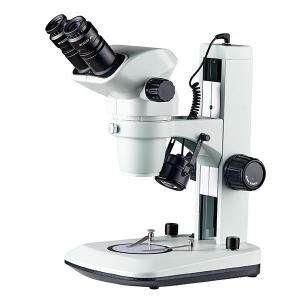

Add to Cart
stereo zoom microscope track stand binocular zoom microscope down
light 6.7X-45X
Stereo microscopes are also known as Dissecting or Low Power
Microscopes. They are used for viewing 'macro' specimens that are
opaque - light is unable to pass through.
Zoom microscopes can refer to stereo zoom microscopes or macro zoom
lens systems. Both of them are fairly different and serve
difference purposes. The term "zoom" refers to continuous viewing
of magnification among a range, for example if the zoom range is 7x
-45x, you would be able to view 7x, 8x, 9x, etc. all the way up to
45x.
Stereo zoom microscopes have eyepieces for viewing samples, and
some have a trinocular (camera) port as well. The typical zoom
range on a stereo zoom microscope is from about 7x - 45x. These
microscopes can be mounted on boom stands, lighted post stands, or
articulated arm stands.
| Eyepiece | Standard | Auxiliary Lens 0.5X | Auxiliary Lens 1.5X | Auxiliary Lens 2X | ||||
| W.D. 105mm | W.D. 177mm | W.D. 47mm | W.D. 26mm | |||||
| Mag. | F.O.V | Mag. | F.O.V | Mag. | F.O.V | Mag. | F.O.V | |
| 10X/22mm | 6.7X | 32.8mm | 3.4X | 65.7mm | 10.1X | 21.9mm | 13.4X | 16.4mm |
| 45.0X | 4.9mm | 22.5X | 9.8mm | 67.5X | 3.3mm | 90.0X | 2.4mm | |
| 15X/16mm | 10.1X | 23.9mm | 5.0X | 47.8mm | 15.1X | 15.9mm | 20.1X | 11.9mm |
| 67.5X | 3.6mm | 33.8X | 7.1mm | 101.3X | 2.4mm | 135.0X | 1.8mm | |
| 20X/12mm | 13.4X | 17.9mm | 6.7X | 38.5mm | 20.1X | 11.9mm | 26.8X | 9.0mm |
| 90.0X | 2.7mm | 45.0X | 5.3mm | 135.0X | 1.8mm | 180.0X | 1.3mm | |
| 25X/9mm | 16.8X | 13.4mm | 8.4X | 26.9mm | 25.1X | 9.0mm | 33.5X | 6.7mm |
| 112.5X | 2.0mm | 56.3X | 4.0mm | 168.8X | 1.3mm | 225.0X | 1.0mm | |
| 30X/8mm | 20.1X | 11.9mm | 10.1X | 23.8mm | 30.2X | 7.9mm | 40.2X | 6.0mm |
| 135.0X | 1.8mm | 67.5X | 3.6mm | 202.5X | 1.2mm | 270.0X | 0.9mm | |
| magnification | standard spec:6.7x-45x,optional eyepiece or auxiliary objective can make magnification to 3.5x-180x | |
| objective | standard spec:0.67x-4.5x zoom objective,zoom ratio:6.7:1,ensure image surface parfocality | |
| viewing head | 45°inclined,360°rotate,interpupillary distance:54-76mm,diopter adjusting range±5 | |
| articulated binocular or trinocular head,splitting ratio 20% 80% | ||
| eyepiece | standard spec.10X/22mm,large sight,wild field,high point,50%/50% spectral | |
| optional eyepiece | 10X/20mm,15X/15mm,20X/10mm (objecmicrometer is available) | |
| working distance | standard:100mm,auxiliary objective can make it to 26mm-177mm | |
| auxiliary objective | 0.5X/165mm, 1.5X/45mm, 2X/30mm, for option | |
| focus arm | adjustable,lift range:50mm | |
| up illumination | 12V/15W halogen reflected illumination | independent switches and light source,brightness can be continuously adjusted independently fluorescent transmitted illumination,brightness fixed LED lighting more even,the brightness more stable low voltage security,low consumption,low calorific value,long service life |
| super bright LED reflected illumination | ||
| down illumination | 12V/15W halogen transmitted illumination | |
| super bright LED transmitted illumination | ||
| videotape interface | with special interface,connect to usual camera,digital camera,imitate CCD,digital CCD,VGA | |
Application field of stereo microscope as follows:
1.Study on the animal science, botany, entomology, histology,
mineralogy, geology, archaeology and dermatology.
2 in the textile industry, for the inspection of raw materials and
cotton fabric.
3 in the electronics industry, as a transistor spot welding,
inspection, etc..
4 various kinds of materials, such as the cracks of the cracks, the
corrosion of the surface and other surface phenomena.
5 in the manufacture of small precision parts, used for machine
tool equipment, working process observation, precision parts
inspection and assembly tools.
6 lens, prism or other transparent material surface quality, as
well as the precision of the scale of the examination.
7 identify cions is true or false .
8 widely used in textile products, chemical, chemical, plastic
products, electronic manufacturing, machinery manufacturing,
pharmaceutical manufacturing, food processing, printing industry,
higher education institutions, archaeological research and many
other fields.
